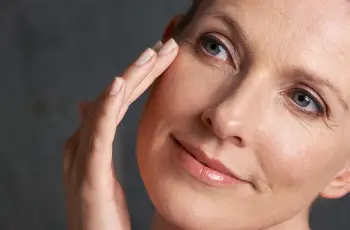
Dealing with hair loss can be a frustrating experience, and finding a solution for successful regrowth can take a lot of trial and error. Identifying the root cause of hair loss is the first step in learning how to treat it. Since vitamin and mineral deficiencies can be a contributing factor to hair loss, it makes sense that supplementing with certain vitamins could be a promising option.
However, what works for one person may not work for someone else, which can make it difficult to find the right option. While there is no magic way to grow hair overnight, some vitamins and minerals are scientifically proven to help prevent hair loss. Here are the vitamins that stimulate hair growth and help you keep your hair healthy.
How do vitamins help the hair growth cycle?
Hair loss, also known as alopecia, is a common condition with many different possible causes. According to Harvard Health, these include hormonal fluctuations, inherited genetic disorders or inflammatory diseases, cancer, stress, pregnancy, certain medications, significant weight loss in a short period of time, and recent surgery or illness.
In some cases, hair loss can also be caused by a deficiency in certain vitamins and minerals. Research suggests that micronutrients may be important for hair follicle development because they play an important role in normal cell growth, turnover, and function. They also agree that some scientific evidence supports the idea that certain vitamins can help treat hair loss. Vitamins can provide important nutrients that support growth and nourish hair follicles.
Unleashed Essentials Kit
SALE
Unleashed Essentials Kit
• 2-month supply
• Designed to work together
• Visibly fuller hair in 90 days
Regular Sale Price $124
Add to Cart
Vitamins and Minerals to Support Hair Growth
While vitamins won’t eliminate hair loss overnight, many of them can help over time if taken regularly at optimal doses — they may just require some patience to work their way into your system. You should also keep in mind that their effectiveness may also depend on the underlying cause of your hair loss.
Before taking a new supplement to help your hair grow back, you should thoroughly research and consult with your doctor. You should also consult with your doctor before taking certain hair growth products, especially those that contain high doses of certain vitamins and minerals that may be contraindicated with daily supplements or vitamins you may already be taking.
Biotin
Biotin, also known as vitamin B7, is known for improving hair growth, but it’s unclear if it really helps as many claim. Biotin is a B vitamin that supports cell metabolism and is the only B vitamin that is not produced by the body. Biotin deficiency has been linked to hair loss — however, researchers note that it is very rare.
According to the Cleveland Clinic, biotin helps produce keratin, which helps form hair and nails, and helps reduce inflammation and maintain hair growth. If you have a biotin deficiency, supplementing with biotin may help alleviate the associated hair loss; otherwise, excess biotin can be harmful. This is one reason why UnTangled Hair Supplement contains only 30 micrograms of biotin, or 100 percent of the recommended daily intake. You can also get biotin from foods like beef, eggs, salmon, pork chops, sunflower seeds, and sweet potatoes, according to the National Institutes of Health.
Vitamin D Deficiency can lead to symptoms like hair loss and dry skin and nails. Research has shown a link between hair loss and low vitamin D levels. There is also research supporting the idea that supplementing with vitamin D can help combat hair loss because it has anti-inflammatory effects and may support the immune system, both of which can play a role in hair growth.
Many of us suffer from vitamin D deficiency without knowing it. Keep in mind that UVB cannot penetrate glass, so you actually have to be outside to get vitamin D from the sun. You can also get vitamin D from foods, such as fatty fish (salmon, trout, and tuna are ideal), cod liver oil, and some mushrooms, as well as dietary supplements.
Iron
Research shows that iron deficiency (the most common nutritional deficiency in the world) is common in women with hair loss. More research is needed to determine if iron actually affects hair growth, but some studies show that iron supplementation may help treat iron deficiency. It’s worth noting that iron has also been shown to help prevent premature graying of hair.
Keep in mind that if you take iron for hair loss, you also need to take vitamin C. Vitamin C plays an important role in the absorption of iron in the body. So if you take iron without vitamin C, your body may not absorb it properly. Foundation’s UnTangled dietary supplement contains optimal amounts of vitamin C and iron (and all the other vitamins listed here) for maximum absorption and best results. You can also get iron through your diet. According to the Cleveland Clinic, foods rich in iron include lean meat and poultry, salmon, beans, lentils, nuts, dried fruit, leafy greens like spinach, and seafood like fortified breakfast cereals.
Vitamin E
Vitamin E helps balance antioxidants and protect against free radical damage. Studies have shown a link between hair loss and significantly reduced vitamin E levels. A promising 2010 study found that participants with alopecia areata (an autoimmune disease that causes hair loss) saw an increase in hair count after taking vitamin E. Researchers believe it may help reduce oxidative stress on the scalp and promote hair growth.
You can get vitamin E through your diet (through foods like sunflower seeds and oil, almonds, and hazelnuts), but you can also get it in tablet form or apply it topically. Vitamin E supplements often contain more than the recommended daily value, according to the NIH, so talk to your doctor before taking it.
Vitamin A
Vitamin A, sometimes called retinol, supports cell growth and is necessary for healthy skin and hair. However, it’s important to get the right balance of vitamin A: studies show that excessive intake of vitamin A can lead to hair loss.
If you’re deficient in vitamin A, this can cause hair loss. If this is the case, taking vitamin A can help alleviate hair loss. Taking more than the recommended daily value of vitamin A in supplement form is not recommended without first consulting your doctor.
Zinc
Zinc is an essential trace element that the body cannot produce on its own, but most people get enough zinc from their daily diet. A side effect of zinc deficiency is hair loss, and in this case, taking zinc has been shown to promote new hair growth. Foundation’s UnTangled dietary supplement contains 100% of the recommended daily value of zinc.
The National Institutes of Health recommends getting most of your zinc through your diet — foods like oysters, meat, fish, poultry, beans, nuts, and whole grains all contain zinc.
Omega-3 fatty acids
Omega-3 fatty acids are healthy fats that are essential for the proper function of cells and provide energy to the body. Taking omega-3 fatty acids often means taking fish oil, which some studies have also found to promote hair growth. A 2015 study found that women who took fish oil supplements experienced significant increases in hair growth and decreased hair loss.
The best source of omega-3 fatty acids is through your diet, which you can find in high amounts in fatty fish like mackerel, salmon, and anchovies.
How to Prevent Hair Loss in the Future
There are many reasons for hair loss, including genetics, autoimmune diseases, stress and depression, hormones, vitamin and mineral deficiencies, poor diet, and more. Identifying the cause is an important part of learning how to prevent and treat hair loss. To keep your hair healthy, consider the following tips:
Follow a Mediterranean diet: The Mediterranean diet consists of foods that are high in unsaturated fats, fiber, and antioxidants and low in saturated fats and animal protein. Research shows that this diet is important for treating hair loss because it involves eating anti-inflammatory and antioxidant-rich foods.
Improve your hair care habits: To keep your hair healthy and prevent hair loss, the American Academy of Dermatology (AAD) recommends hair care practices such as always using conditioner, gently massaging shampoo into your scalp, letting your hair air dry before brushing it, minimizing heat styling and dyeing or highlights, and gently combing your hair every day. The AAD also recommends avoiding hairstyles that strain the hair, such as tight buns and ponytails, cornrows and braids, or extensions.
Try home treatments and supplements: The AAD recommends trying at-home over-the-counter hair loss products, such as those containing minoxidil or at-home laser caps. Foundation Skincare has launched an UnTangled Hair supplement that is formulated with vitamins to help with thinning hair and improve hair volume and health. UnTangled was developed by a board-certified dermatologist who specializes in treating hair loss. It contains optimal amounts of clinically proven ingredients like vitamins A, C, D, and E, as well as zinc and iron. It provides nutrients to hair follicles while increasing keratin production to promote hair growth. Since it can be difficult to get the optimal amount of each vitamin through your daily diet, a balanced and carefully formulated supplement like Untangled is a sure way to ensure you get enough of these vitamins, especially if you suffer from thinning hair or hair loss.
Try Professional Treatments: You can talk to your doctor or dermatologist about trying professional hair loss treatments such as: B. steroid injections, hair transplants, or laser treatments. In some cases, your doctor may also provide prescription medications that can help treat hair loss.


